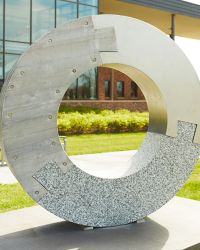Academic Integrity Policy S3.28.
General Statement of Policy
Academic integrity is highly valued at St. Cloud Technical & Community College and throughout higher education. Maintaining academic integrity is the responsibility of every member of the college community: faculty, staff, administrators and students. The objective of this policy and procedure is to ensure that the highest level of respect for intellectual achievement is maintained at every level of college life and across all modes of learning, whether in class, online, at home, or during collaboration with other students, faculty or staff. Respect for intellectual achievement is upheld through the principles of honesty, fairness and due process established in this policy and procedure.
Examples of maintaining academic integrity consist of the creation of the student’s own class assignments, proper citation of sources of information, truthful recording of lab results and respecting and not interfering with the work of other students.
The following actions are considered violations:
Cheating
- The use of unauthorized assistance when taking course quizzes or exams.
Plagiarism
- The use of another person’s work through summary, paraphrase or direct quote without proper acknowledgement.
- The purchase or solicitation of academic work.
- The use of a paper you have/had written for another class without permission from your current instructor(s).
Fabrication
- Creating fake results in an experiment, paper or clinical report. Otherwise, “making up” something that is presented as true, factual, or real.
Collusion
- A formal or informal agreement by two or more individuals to commit an act of academic dishonesty.
Academic Integrity Procedure (S3.28.1)
Sanctions and Appeals for Academic Integrity Violations
The goal of the academic integrity procedure is to ensure a fair and timely resolution to allegations of academic dishonesty. Sanctions for academic integrity violations will follow procedures outlined in S3.26.1: Student Code of Conduct Procedure. In addition, sanctions for Academic Integrity Violations include the following:
A. The instructor communicates the allegation of a violation of academic integrity policy to the student. The instructor submits the Academic Integrity Incident Report to be entered into the Academic Integrity Database.
- Action 1: The student accepts the allegation. The violation is entered into the database. Outcome as outlined in the course syllabus is implemented.
- Action 2: The student does not accept the allegation. The student completes the Academic Integrity Appeal Form. For all academic integrity issues, a committee comprised of three members, at least two being faculty, drawn from the Academic Integrity Committee examines the allegation and determines whether the violation occurred. The findings of the appeals committee will be completed within ten (10) business days upon receipt of the Academic Integrity Appeal Form.
a. Result 1: The committee determines that the violation did occur. The outcome as outlined in the course syllabus is implemented. The violation is counted in the Academic Integrity Database.
b. Result 2: The committee determines the violation did not occur. The violation is not counted in the Academic Integrity Database. The instructor will be notified that the appeal was approved for reconsideration.
B. Following the second academic integrity violation during the student’s tenure at SCTCC, the student will be made aware that their academic standing is being changed to probationary status (a hold is placed on their registration) and the student will be scheduled to participate in an academic integrity training session. If the student fails to attend, the hold remains on the student’s record.
C. Following a third academic integrity violation the student will meet with a senior academic officer. Additional academic integrity violations can constitute grounds for suspension or dismissal as outlined in S3.26.1: Student Code of Conduct Procedure.
Students can appeal the accusation of cheating, not the outcome of a violation. If a student does not accept the allegation of an academic integrity violation they must complete the Academic Integrity Appeal Form within 20 days.
Writing and Plagiarism Resources
- SCTCC Center for Academic Success (CAS)
- plagiarism.org
- Preventing Plagiarism - The Purdue Online Writing Lab
Other Schools’ Academic Integrity Policies
Cultural Understandings of Plagiarism
- Cultural Perspectives on Plagiarism - Washington State University
- A Different Perspective on Plagiarism - Dahlia Syahrani Md. Yusof
